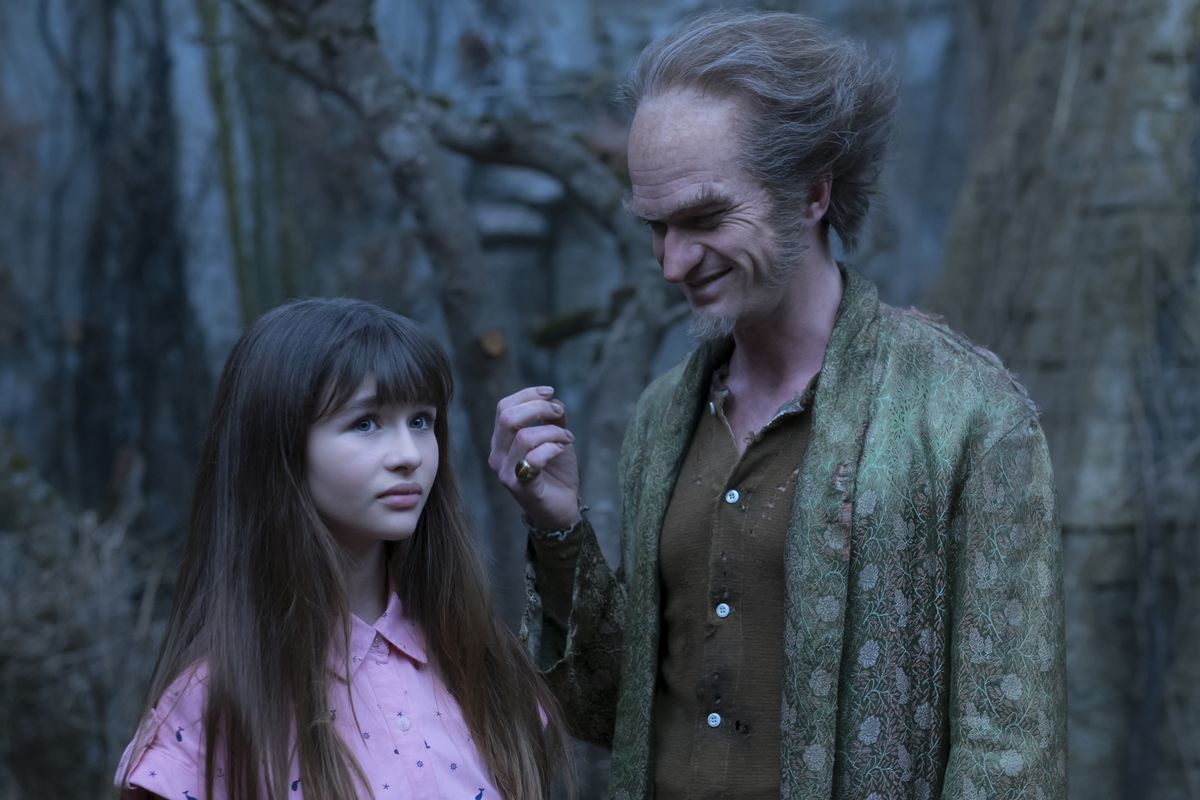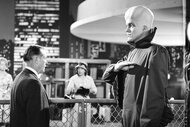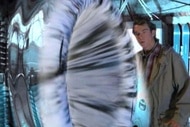Create a free profile to get unlimited access to exclusive videos, sweepstakes, and more!
Stream This: A Series of Unfortunate Events is melancholic, artistic, and irresistible

Look away, look away! This article has nothing but truly awful things to say. As TV recommending goes it's bound to trash your day, so look away… look away… look away.
What could possibly be our latest streaming recommendation? It's none other than the Netflix adaptation of A Series of Unfortunate Events, based on the book series by "author" (and character) Lemony Snicket. Though Snicket is credited with the authorship of the series, in reality, they come from Daniel Handler... don't tell Mr. Snicket that, though.
The book series has been adapted before — in 2004, during the Harry Potter book-adaptation boom, there was the film Lemony Snicket's A Series of Unfortunate Events. Directed by Brad Silberling, the movie featured Jim Carrey as the villainous Count Olaf, and it also included Meryl Streep, Emily Browning, and Catherine O'Hara in the cast.
It's a pretty good movie, one that I enjoyed when it came out and have continued to enjoy over the years. The only problem with it is that it doesn't tell the entire tale of the Baudelaire orphans. They lose their parents and their home in a horrible fire, and then they bounce from one guardian to another as Count Olaf tries to seize their fortune. It adapts the first three books in the series, and then it ties the whole thing up in a little bow, with nary a sequel to untie it again.
That mostly works for the film, but true devotees of the book series will miss many wonderful things that happen after the first three books. Major story points like the VFD are only hinted at, characters like Esme Squalor and Kit Snicket never have a chance to enter the proceedings, and the Olaf storyline doesn't get to go nearly as deep as it ought to. It's a pretty movie to look at (with a great Thomas Newman score) and the performances are great, but there's just so much more potential to be tapped.
That's why the series on Netflix is such a wonderful thing. It goes through the stories of the first three books, and then it keeps on going, adapting the rest of the books in full. In three seasons, the show depicts the entirety of the Baudelaire tale, and it even throws in some ancillary details from Handler's extended source material.
The result is a beautiful and haunting ride, and as a piece of long-form storytelling, it really is something special.
Barry Sonnenfeld directed many of the episodes, but even when he's not at the helm the show very much feels like it is in his storytelling lane. There's a whimsical Wes Anderson feeling that runs through the series, and this helps to offset the gruesome subject matter. The title does not lie — there are unfortunate events happening left and right, and Violet (Malina Weissman), Klaus (Louis Hynes), and Sunny (Presley Smith) Baudelaire are constantly on the run from a host of utterly incompetent adults.
Neil Patrick Harris takes over as Count Olaf, and though he's not as knives-out scary as Carrey was in the film, he's allowed a lot more depth. There's more to Olaf than just the villainy, the bad acting, and the endless disguises — this time we get to see his arc play out in full. We also get a lot of Harris singing, which is fantastic. He sings the theme song (which inspired the intro to this article), and as the show goes on it's always updating itself. Harris also sings few more catchy songs throughout.
Olaf's story ties directly into the larger mystery of the VFD, and by the show's end, you'll know all about what that actually is. You'll also hear a lot about a "schism" as well as endless shouting about a mysterious sugar bowl.
Esme Squalor is out to obtain that particular piece of crockery, and she pops up for full awfulness in Season 2, played by the wonderful Lucy Punch. The adventurous Kit Snicket also eventually makes a welcome entrance, played by Allison Williams. Kit is one of the only adults who is of any use, so she's a welcome presence. Other actors who pop in (and out) include (but are not limited to), Nathan Fillion, Will Arnett, Cobie Smulders, Sara Rue, Roger Bart, Tony Hale, Joan Cusack, Aasif Mandvi, Alfre Woodard, Richard E. Grant, Rhys Darby, and Beth Grant. Catherine O'Hara returns, though she plays a different character. So what? It's just great that she's here.
Weissman and Hynes bring a grounded reality to our heroes, making them easy to root for. The adults, by and large, are very good at being infuriating. K. Todd Freeman probably manages to infuriate the most of all, as his endlessly-coughing Mr. Poe puts the Baudelaires in danger again, and again, and again. His incompetency quickly becomes full-on child endangerment, but this befuddled moron doesn't listen to a single word that the Baudelaires say. None of the adults do. Most of them would live longer if they did, but no. Anyway, Mr. Poe is awful, but Freeman steals every scene he's in.
One of the hardest things for any adaptation of this book series to accomplish would be to bring the dark, melancholic narration of the author "Lemony Snicket" into the proceedings. That is where this show hits its highest notes — it makes Snicket a character, with him usually acting as a wall-breaking narrator, and he comments on the events of the story much like Snicket does in the book's narrative.
Patrick Warburton is sensational as Snicket, delivering the most maudlin of sentiments with the deadpan stoicism that has made him so invaluable to so many different projects. His asides are probably my favorite part of the show (your mileage may vary), and nothing beats Warburton's Snicket delivering a deep drone line such as, "If an optimist were to have his right arm bitten off by an alligator, he might say, oh boy, half-price manicures for life."
Why exactly does Mr. Snicket know so much about the story of the Baudelaire orphans? That's something that the show answers, but it's clear from the outset that Snicket (and some of his family) are pivotal players in it. How it all ties together is fascinating once the end comes around, and it will leave you very satisfied. Book readers won't be as surprised, but there are treats in store for them too.
It bears repeating: the title of this show doesn't lie. Snicket himself opens most episodes with a variation on the line, "If you're interested in stories with happy endings, then you would be better off somewhere else." Most of the time, he says these things after we get title cards promising devotion to a dead woman named Beatrice. Who is she exactly? You'll find that out too.
There's a song that closes the first season of the series that not only perfectly describes the mood of the show, but life in general. Snicket, Olaf, the orphans, and even Mr. Poe get a verse in it. I didn't expect such a kooky tragicomedy to elicit any real emotion in me (I'm more of a deadpan Snicket type, at least on the surface), but the song made it happen.
"There's no happy endings, not here and not now, this tale is all sorrow and woes. You might dream that justice and peace win the day, but that's not how the story goes."
These lyrics have haunted me ever since I first heard them. I think of them often, especially in 2019. The full story of the Baudelaire orphans, now streaming in its entirety, dares to fill you with hope, but it never lies to you about how the world works. Through some strange alchemy, this all adds up to be one joyous viewing experience.
Though Harris' Olaf beckons you to look away at the start of every episode, I implore you to ignore that advice. Look right at this thing, and face it fully. Learn from the courage of the children, and the mistakes of the adults. Children should feel safe and secure around adults… but that's not how the story goes.


























